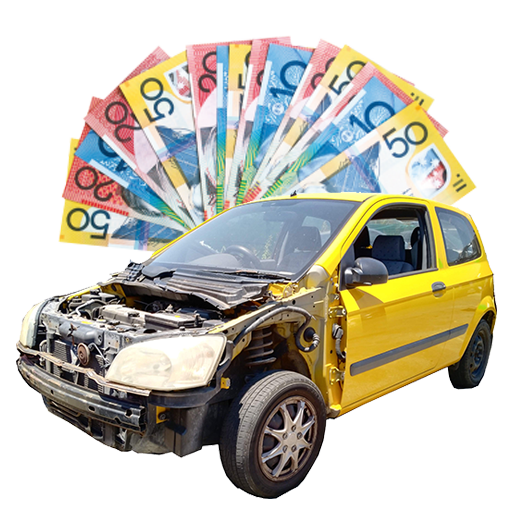Got an old car that's seen better days? Turning it over to a wrecker isn't just a last-ditch effort—it's often the smartest and most profitable move you can make. It's a simple way to convert that vehicle taking up space into quick cash, without the usual headaches of a private sale.
Why Selling to a Wrecker Is Your Smartest Move
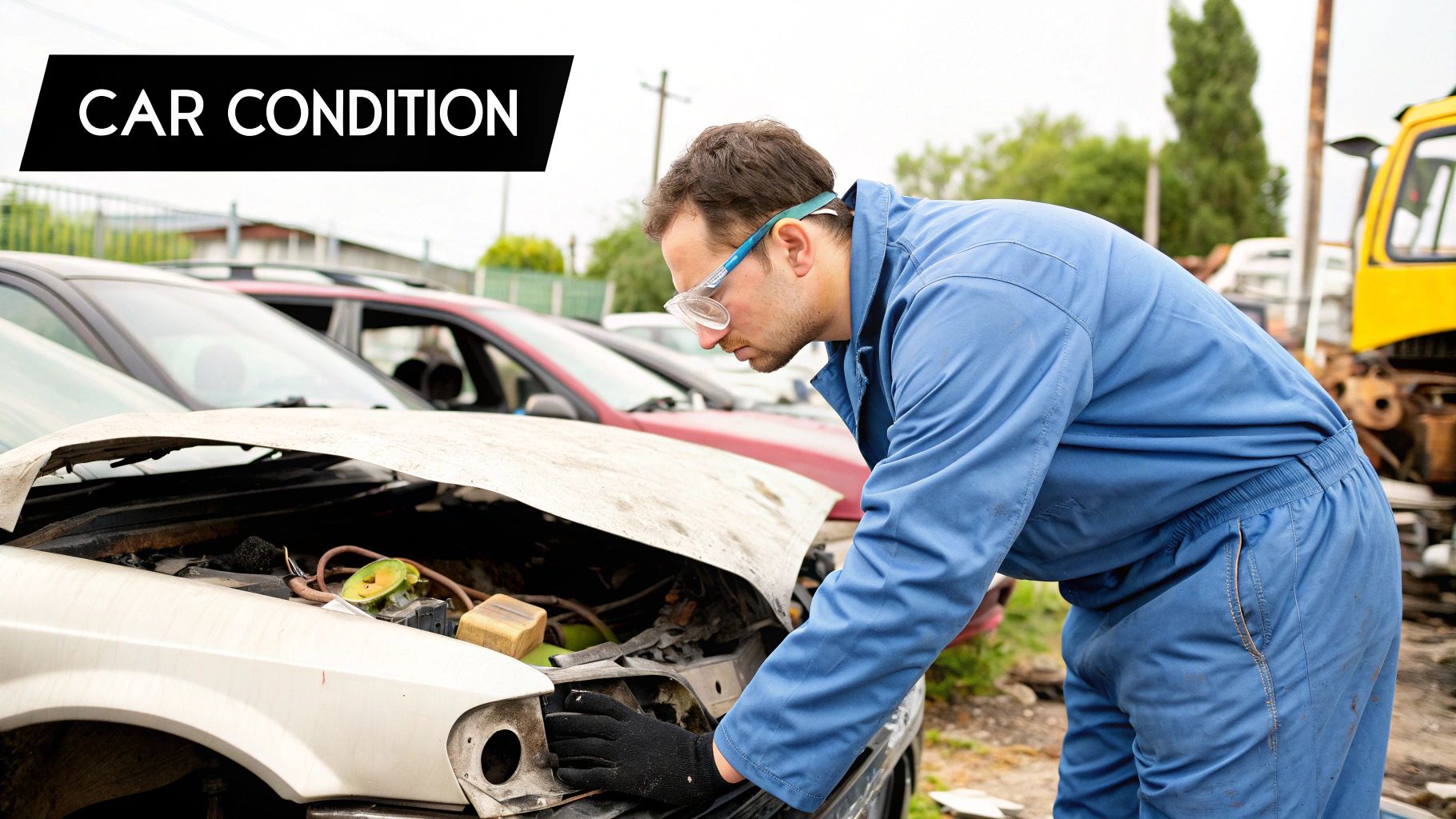
Let's be honest, trying to sell an old, damaged, or non-running car privately can be a nightmare. You're dealing with low-ball offers, tyre-kickers who never call back, and the endless hassle of paperwork and negotiations.
Selling to a wrecker cuts through all that noise. That car sitting in your driveway, gathering rust and becoming a neighbourhood eyesore, is a depreciating asset. Wreckers see its value in parts and scrap metal, allowing you to unlock its remaining worth with a single phone call.
The Financial and Environmental Upside
Beyond just getting rid of an unwanted vehicle, choosing a wrecker brings some serious, tangible benefits. You're not just clearing out your garage; you're making a savvy decision that pays off in more ways than one.
- Instant Cash in Hand: Wreckers value your car for its scrap metal weight and any salvageable parts. This translates to a fair price and, quite often, same-day payment.
- Zero Hidden Costs: Forget about spending money on ads, pre-sale repairs, or a roadworthy certificate. A good wrecker takes the car as-is and even provides free towing.
- A Greener Choice: This is a big one. Wreckers are the unsung heroes of automotive recycling, playing a massive part in the circular economy.
Selling your car to a professional wrecker ensures that every usable part gets a second life and hazardous fluids are disposed of safely, keeping them out of our environment.
In Australia, the auto wrecking industry is driven by sustainability. Did you know that over 80% of a vehicle's material is recyclable metal? By using a wrecker, you're helping to reduce landfill and conserve resources. They’re the experts at safely handling oils, batteries, and old tyres, making your decision an genuinely eco-conscious one.
If you're weighing up your options, finding reputable auto wreckers near you is the perfect first step toward a quick and painless sale. For some broader advice on selling vehicles and other automotive topics, you can Explore car selling tips on the Cars4Go blog.
How to Figure Out What Your Car is Really Worth to a Wrecker
Getting a fair price for your old car starts with understanding what a wrecker actually sees. To you, it might be a rust bucket that's seen better days, but to a professional, it’s a treasure trove of reusable parts and valuable metals. Knowing what they're looking for puts you in a much better position to negotiate.
The starting point for any valuation is always the car's make, model, year, and overall condition. It’s no surprise that a newer car with parts that are still in high demand will get a better offer than a common, older model that’s been picked over for years.
Then there’s the current market price for scrap metal. This is the foundation of any offer, and it can change daily. That means a quote you got last month probably isn't what you'll be offered today.
The High-Value Parts Wreckers Want
Beyond the basics, some specific components can seriously boost your car's cash value. These are the bits and pieces that can be salvaged and sold to other car owners or mechanics.
- The Big Two: Engine & Transmission. If these are still in decent working order (or can be easily reconditioned), they're gold. A solid engine can be the most valuable part of the entire car.
- Catalytic Converter. Don't underestimate this one. It’s packed with precious metals like platinum, rhodium, and palladium, making it surprisingly valuable.
- Body & Interior. Doors, bonnets, bumpers, and even seats or dashboards in good nick can be sold on. If your car has had a mechanical failure but the body is straight, that's a big plus.
A key thing to remember is that a wrecker's offer is a mix of scrap value and the resale potential of its parts. I've seen non-running cars with great engines fetch more than cars that still drive but have a completely shot-out interior and worn drivetrain.
If you're looking for a quick sanity check, a scrap car value calculator can give you a ballpark figure before you even start making calls. It's a great way to set your expectations.
How Vehicle Condition Affects Wrecker Payouts
The condition of your car has a direct impact on the final cash offer. A vehicle that's been in a major accident will be valued differently from one that simply stopped running. This table gives you a rough idea of what to expect.
| Vehicle Condition / Component | Potential Impact on Value | Example Scenario |
|---|---|---|
| Running Condition | High Positive Impact | A 15-year-old ute that still runs and drives is worth more for its parts than a newer, non-running sedan. |
| Major Accident Damage | High Negative Impact | If the frame is bent or the engine block is cracked, the car is likely valued only for its scrap metal weight. |
| Intact Interior & Panels | Moderate Positive Impact | A car with a clean, undamaged interior and straight body panels can have its seats, doors, and bumpers salvaged. |
| Missing Key Parts | High Negative Impact | If you've already sold the catalytic converter or engine, the wrecker's offer will drop significantly. |
| Aftermarket Parts | Variable Impact | A set of high-end alloy wheels or a quality bull bar can add value, but only if they are in demand. |
Ultimately, a complete car, even a non-runner, is almost always worth more than one that has been stripped for parts before the wrecker arrives.
Don't Forget the Paperwork
What you have in your glovebox is just as important as what's under the bonnet. Wreckers are running a business, and they need to make sure every transaction is above board and that you're the legal owner.
This is a breakdown of what most wreckers will ask for before they hand over any cash.
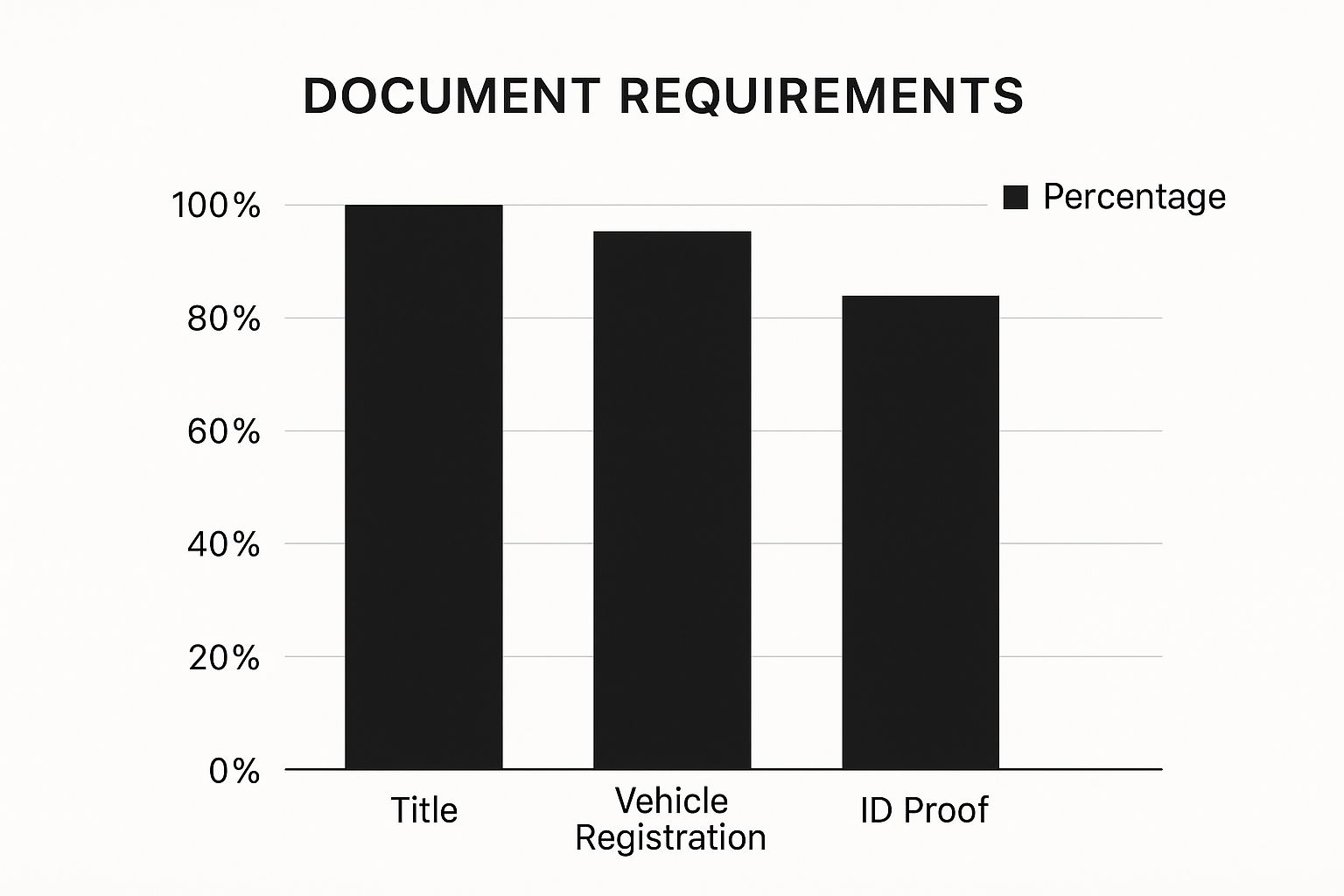
As you can see, proof of ownership is non-negotiable. Having your title and registration papers ready will make the whole process smoother and faster for everyone. It’s the first thing you should get in order.
Getting Your Car Ready for a Hassle-Free Sale
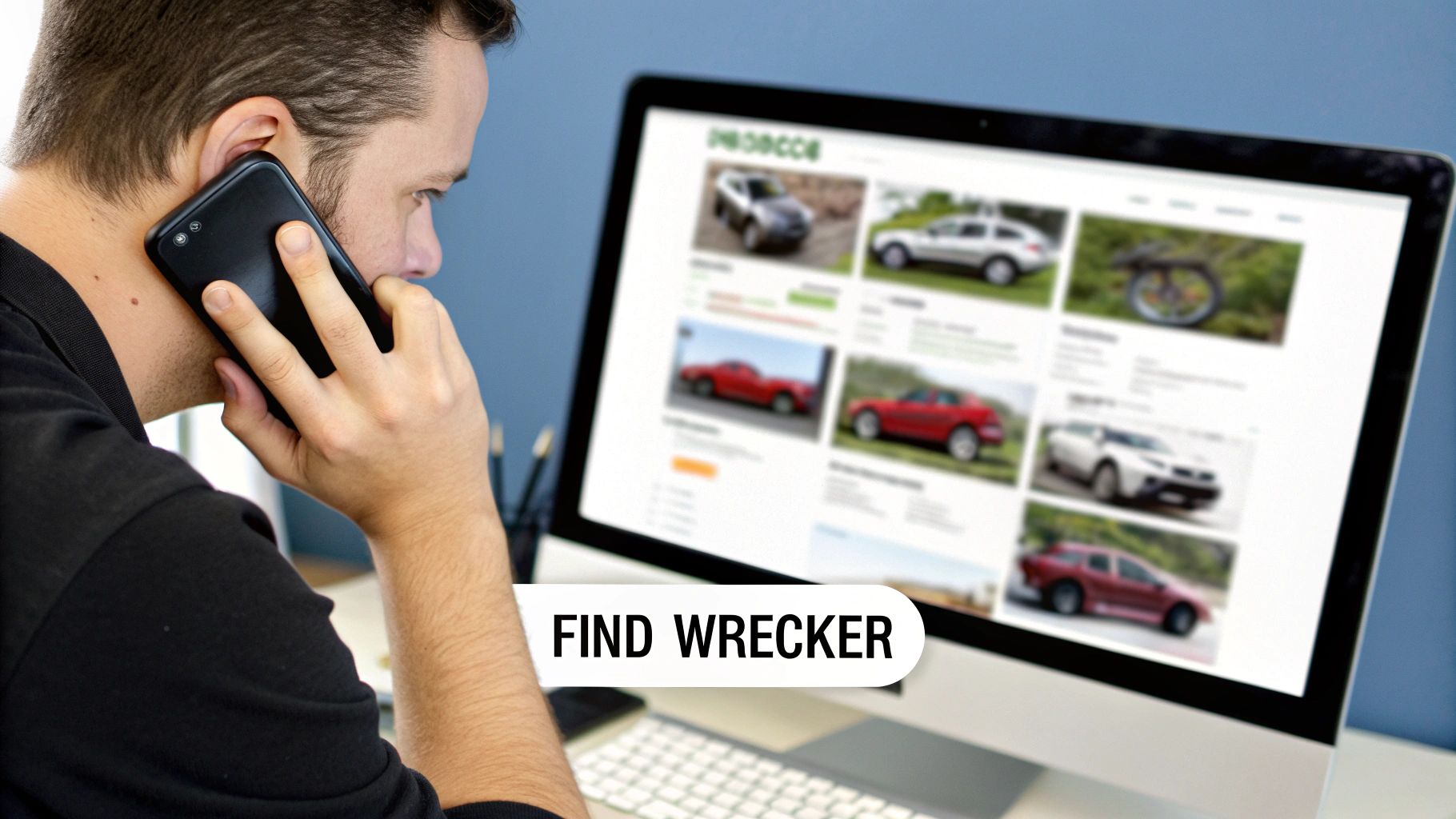
Before the tow truck pulls up, a little bit of prep work can make a world of difference. When you sell a car to a wrecker, taking care of a few things beforehand guarantees a smooth handover with no last-minute hitches. It’s the fastest way to get paid and get on with your day.
First up, and this is the big one: give your car a final, thorough clean-out. It's amazing what gets left behind. Be sure to check every single nook and cranny—glove box, centre console, door pockets, under the seats, and especially the boot. I once had a client who found some old family photos they'd given up on, tucked away in a seat-back pocket.
Sorting Out Your Paperwork and Prepping the Vehicle
Once all your personal stuff is out, it's time to get the paperwork in order. This part is absolutely crucial for a legal, above-board sale and proves you're the rightful owner.
You’ll need to have a couple of things on hand:
- Proof of Ownership: Your vehicle's registration certificate (the rego papers) is the most important document.
- Personal ID: A valid driver's licence or another form of government-issued photo ID.
- Proof of Purchase: If you still have it, this can sometimes help speed things along.
With the documents sorted, you might be tempted to start pulling things off the car yourself. People often ask if they should strip valuable parts or drain the fluids to try and make a few extra dollars on the side.
Expert Tip: Don't do it. Wreckers base their cash offer on the assumption that they're getting a complete vehicle. If you start removing things like the battery, stereo, or catalytic converter, you can bet your final payout will be lower. Messing with fluids like oil and coolant can also be messy and dangerous if you don't have the right gear.
Honestly, it's safer and financially smarter to let the pros handle the disassembly. They have the specialised tools and know-how to do it all safely and in an eco-friendly way. A little preparation makes all the difference for a quick, easy, and painless transaction on pickup day.
Getting Paid and Saying Goodbye
So, you've accepted an offer. Great! The rest of the process is usually pretty quick and painless. This is the part where your old car finally turns into cash in your pocket, but it pays to know exactly what to expect on the day.
A good wrecker will always be in touch to lock in a pickup time that works for you. They get that you have a life, so many offer weekend or after-hours collections. When the tow truck driver shows up, their job isn't to haggle over the price again; it's simply to make sure the car is what you said it was.
What Happens on Pickup Day
The driver will do a quick walk-around of the vehicle. They're just confirming the basics – make, model, and that the main parts like the engine and gearbox are still there. It's a routine check to make sure the car's value matches the quote you were given.
- Signing the Paperwork: You'll have to sign over ownership. The driver will bring the forms, so you don't need to worry about printing anything.
- Showing Your ID: Have your driver's licence ready. They need to match your ID to the car's ownership details to make sure everything is above board.
- Getting Your Money: This is the best part. You'll get paid right then and there. It could be cash, a company cheque, or even an instant bank transfer, depending on how they operate.
Your Final To-Do List
Once the car is on the truck and the money is in your hand, you have one last, very important job to do: file a Notice of Disposal. This is a simple form you submit to your state's transport authority to let them know the vehicle is no longer yours. Do this straight away. It protects you from being held responsible for any future fines or tolls racked up by that car.
The Australian auto wrecking industry is a big one, with around 990 businesses and employing roughly 3,800 people across the country. This means the process is usually quite polished. Wreckers often use a professional car transportation company to manage the collection, so you're dealing with pros.
My Pro Tip: Never, ever hand over your keys or sign the final papers until you have the payment confirmed. A legitimate wrecker pays you before they hook up your car, not after.
Finally, don't forget to cancel your registration and car insurance. Many wreckers also provide free car removals, which means you won’t pay a cent for the tow. It’s all part of the service, making the whole experience hassle-free from start to finish.
Don't Leave Money on the Table: Common Mistakes to Avoid
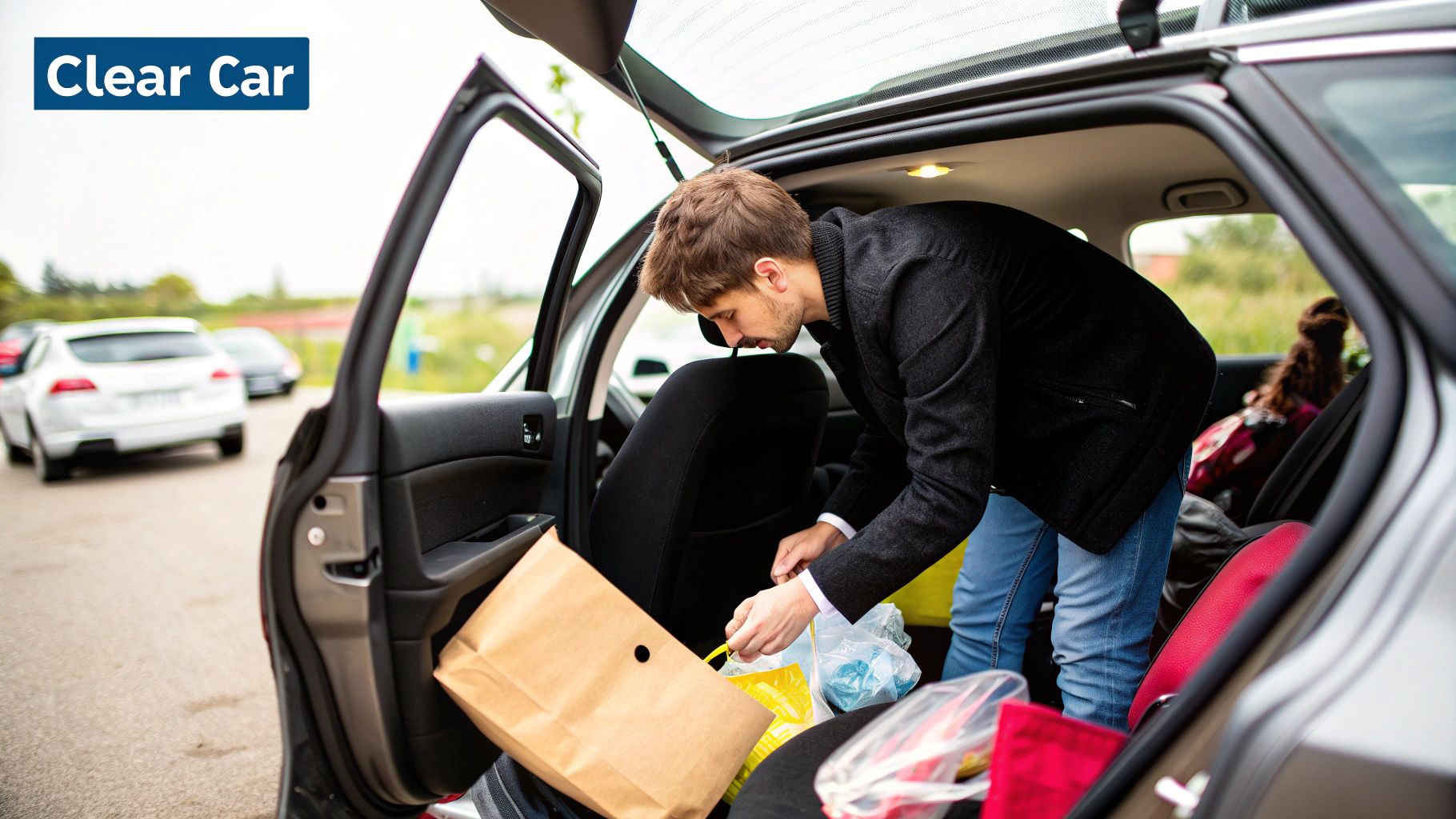
When you're ready to sell your car to a wrecker, it's easy to make a few common slip-ups that can cost you. The biggest mistake I see people make? Accepting the very first offer they get. It's tempting to take the quickest path, but that path rarely leads to the best price.
Think about it: different wreckers need different things. One might be flush with Toyota parts but desperate for Holden bits. That's why taking an extra 30 minutes to get at least three quotes is so crucial. A little bit of shopping around can easily put hundreds of extra dollars in your pocket.
Dodging Shady Operators and Hidden Traps
Another major pitfall is accidentally dealing with an unlicensed operator. They often lure you in with a big promise over the phone, only to show up and start chipping away at the price for every little scratch and dent. It’s a classic bait-and-switch.
The Australian motor vehicle dismantling industry is a massive, fragmented market, on track to be worth around $1.3 billion by 2025. This means there are tons of small and medium-sized businesses out there, so a little bit of homework goes a long way. You can dig deeper into these industry stats over at IBISWorld.
I can't stress this enough: never, ever hand over your keys or sign final paperwork until the payment is confirmed. A reputable wrecker pays you before they tow the car, not after.
Lastly, don't forget the final piece of paperwork. You'd be surprised how many people forget to lodge the Notice of Disposal with their state's transport authority. It’s a simple form, but it's what officially gets the car out of your name. Skip this step, and you could be on the hook for future fines or tolls tied to that vehicle. Avoiding these few traps ensures the whole process is smooth, profitable, and hassle-free.
Got Questions? We've Got Answers
Even after walking through the whole process, a few specific questions tend to come up. It's completely normal. Here are some quick, straight-to-the-point answers to the queries we hear most often.
What if I Can’t Find My Rego Papers?
Don't panic—this happens more often than you'd think. While having your registration papers is the smoothest way to prove ownership, it's not a deal-breaker.
Any reputable wrecker can usually work around this. You'll definitely need your driver's licence and the car's VIN (Vehicle Identification Number). With that information, they can typically verify you're the legal owner through official databases, keeping everything above board.
How Do Wreckers Actually Calculate Their Offer?
It’s not just a random number they pull out of thin air. The final price you're offered comes down to a mix of three key things:
- The make, model, and age of your car.
- The current market price for scrap metal, which fluctuates daily.
- The demand for its salvageable parts. A busted-up Commodore with a sought-after engine might fetch a better price than an older, running car with no high-demand parts.
A quick tip: You don't always need to be there for the final pickup. As long as you've sorted everything out beforehand, many wreckers offer a completely contactless removal. Just leave the keys and signed paperwork in a pre-arranged, secure spot.
Do you have an old, scrap, or unwanted car taking up space in Adelaide? The team at Auto Removal Adelaide can help you get rid of it fast. We offer top cash offers and provide free car removal services across the area. Turn your junk car into instant cash today by getting in touch through our Auto Removal Adelaide website.

